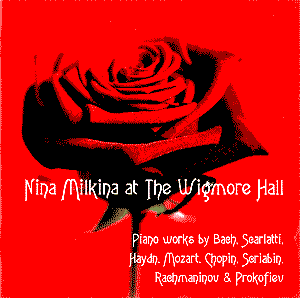The title "Nina Milkina at the Wigmore Hall"
may suggest a live recital but no, these are recordings made originally
for Pye in the Wigmore Hall but under studio conditions. All the same,
while a single recital would not have contained so much music as these
two well-filled CDs, the actual mix of composers is characteristic of
the programmes with which this artist delighted audiences at the Wigmore
Hall and elsewhere from the 1930s through to her retirement for reasons
of health in 1991. The Pye catalogue is now owned by EMI who have decided
in their wisdom that a reissue of these recordings on one of their own
labels is of no interest; at least they have been sufficiently enlightened
as to make the masters available to the family for a private CD transfer
(the above-named Alex Sedgwick is Nina Milkina’s son) and in a just
world they would make the family fortune, for this is a wonderful tribute
to an artist who, having made only a very few records, is scarcely a
name to younger listeners today.
Of the two works which make up the second volume of
Bach’s Klavierübung, the Italian Concerto and the French
Overture, it is the former which has become a standard repertory choice,
its smaller dimensions and thematic linearity making it a useful curtain-raiser
for aspiring artists, while the French Overture is often felt to be
over-long and, worse still, to have its melodic lines excessively cluttered,
in the French manner, with ornaments and flourishes. Not, however, when
it is played as well as Nina Milkina plays it. It is true that her gentle
opening, without a jerky double-dotting in sight, may suggest a Bach
interpreter of yesteryear (when this same music returns at the end of
the Ouverture, she begins grandly, gradually subsiding to piano), but
her nimble staccato playing of the main fugal section is timeless and
has a clarity that even a harpsichordist would envy. In all the following
dances she maintains the textures light and the melodic lines clear,
no small achievement in the second gavotte with its concentration on
the lower register of the keyboard. Many pianists of the pre-Gould generation
(Kempff for instance) preferred to omit most of Bach’s trills, mordents
and the like, on the ground that they worked on the harpsichord but
disturbed the melodic line on the piano. Nina Milkina plays them and
shows that, with a proper touch, they do not in any way prejudice melodic
simplicity. A certain B minor melancholy hovers over this work, yet
the overall impression of this performance is that of Bach as a friendly,
companionable composer.
If the Bach gets a beautiful performance, the Scarlatti
is quite wonderful. At times Milkina’s staccato touch has such a fiery
brilliance that she seems actually to be playing a harpsichord. Yet
she does not hesitate to enlist the full range of piano sonorities when
Scarlatti is evoking the thrumming of a guitar or the sheer mystery
of Spain. She finds a different sound-world for each sonata and her
improvisatory manner always reveals the sense of Scarlatti’s often wayward
changes of direction. Whatever other Scarlatti you have in your collection,
don’t miss this.
The prevailing tone of Milkina’s Haydn and Mozart is
gentle, songful and friendly, though this does not prevent her from
rapping out the opening octaves of the Mozart sonata most assertively
or from drawing attention to the surprising harmonic twists in the extraordinary
D major minuet. In the early days of the BBC Third Programme Nina Milkina
performed all Mozart’s sonatas, and she also gave a bicentennial programme
in 1956 at the Edinburgh Festival. It would be nice to think that at
least some of this material survives and may one day be issued on CD.
In the public mind, Milkina’s name was associated above
all with Mozart and Chopin. Unterschrift Classics have already reissued
her recordings of the Mazurkas and Preludes, both of which I have previously
reviewed. (My apologies to readers who attempted to order the disc of
Preludes; the e-mail address given in the review was an old one. That
listed above is correct). The Ecossaises seem to belong neither to Chopin
nor to Scotland, but Milkina makes the most of their salon charms. The
Nocturne is also comparatively rare (Rubinstein’s set of the Nocturnes
does not include it) but is wholly characteristic of the composer and
is performed with a beautifully sustained singing line and great poetry.
The considerable difficulties of the Scriabin studies
clearly do not worry Milkina, who concentrates on their purely musical
values, finding humour in no. 10 and a gentle songfulness in no. 11.
No. 12 is a favourite encore piece of college students, and those who
regard it as above all an excuse to make a lot of noise might be disappointed
by Milkina, who builds it up gradually, finding grandeur and dignity
as well as passion. The Rachmaninov prelude, with its inconsolable rocking
motive, is moving in its restraint while in the Prokofief her innate
musicality finds a sinister fairy-tale rather than an exercise in hard-hitting
virtuosity.
Though I have never heard the original LPs, the transfers
are clearly excellent and the piano sound stands up very well to modern
standards (better, perhaps, than was the case with the Chopin issues);
the booklet has good notes by David Mather. I can only conclude as I
began; this is a wonderful tribute to an artist whose name should never
have passed into semi-oblivion and I hope it will have the success it
deserves.
Reminder: the other CDs by Nina Milkina available from
Unterschrift Classics are:
Chopin: Complete Mazurkas (2 CDs) (see
review)
Chopin: Preludes (see
comparative review "A Quintet of Chopin Preludes").
Christopher Howell
